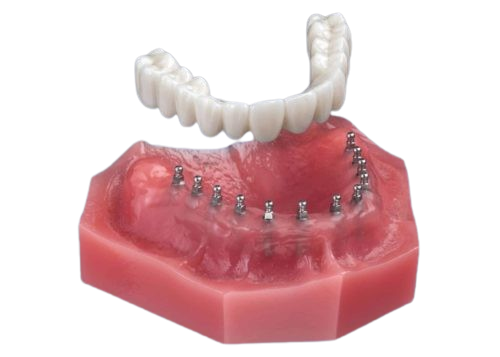Do you remember how big and bulky the first cell phones were? Back in the late 80s and early 90s, they looked more like plastic bricks than today’s sleek, modern smartphones. Over the last 30 years, technological advancements have made phones smaller and more efficient, and the evolution of dentures and dental implants has followed a similar path. Your grandparent’s dentures were bulky pink plastic contraptions that didn’t look or feel natural. These days, modern implant dentures can replace all your teeth without the bulky plastic support structure. Thanks to the innovation of mini dental implants, a roundhouse dental bridge provides a stable, functional, and natural-looking way to quickly replace an entire arch of teeth.
The Evolution of Dentures
A set of full dentures is designed to replace all your teeth with artificial ones. Throughout different periods of history, this was accomplished with bone, wood, ivory, gold, iron, lead, and eventually, acrylic and plastic. However, one of the biggest problems with traditional dentures has always been stabilizing the replacement teeth. Various wire, rubber, and ivory supports were tried, but none of them could anchor your teeth as well as your natural tooth roots. Not even 20th-century options were immune—pink plastic dentures lose their fit as your jawbone deteriorates from tooth loss.
 It wasn’t until the advent of dental implants that we found a solution to this issue. Dental implants are titanium posts that we insert into your jawbone to support crowns, bridges, and dentures. The titanium fuses with your jawbone over time, known as osseointegration, and creates an incredibly strong anchor point for replacement teeth. Moreover, the implants stimulate your jawbone, preventing the bone and tissue deterioration that comes with missing teeth. This has been an excellent solution, but early implant dentures still had the problem of a larger denture base that didn’t look or feel very natural. Eventually, two important innovations in dental technology made today’s implant denture options possible.
It wasn’t until the advent of dental implants that we found a solution to this issue. Dental implants are titanium posts that we insert into your jawbone to support crowns, bridges, and dentures. The titanium fuses with your jawbone over time, known as osseointegration, and creates an incredibly strong anchor point for replacement teeth. Moreover, the implants stimulate your jawbone, preventing the bone and tissue deterioration that comes with missing teeth. This has been an excellent solution, but early implant dentures still had the problem of a larger denture base that didn’t look or feel very natural. Eventually, two important innovations in dental technology made today’s implant denture options possible.
Mini Dental Implants and Roundhouse Bridges
Mini dental implants evolved from traditional dental implants, bringing the same stability and functionality in a smaller package. Their slimmer, sleeker design gives them several advantages over their larger predecessors, including a minimally invasive placement procedure, much faster healing time, and greater versatility in how we can use them. They don’t require incisions, stitches, or bone grafts and are great for patients with smaller jawbones. Plus, thanks partly to lower manufacturing costs and fewer appointments, mini implants are less expensive than traditional implants while being just as reliable and durable. Those “amazing minis” are gaining popularity among patients and dentists alike for all the benefits they offer.
But mini implants aren’t the only important innovation in modern implant dentistry. As dental implants became smaller and more effective, they went from supporting one tooth to a full arch of teeth. The bulky pink base that was once required to support a set of dentures got smaller and smaller until we eventually ended up with today’s modern roundhouse dental bridge. This denture prosthetic consists of only the teeth, with no plastic base required. We connect the roundhouse to 6-12 mini dental implants, and it offers the most natural look and feel available.
Understanding Roundhouse Dental Bridges
A roundhouse dental bridge looks like a full set of pristine white teeth connected in a semicircle. The teeth are made from zirconia, a material ten times harder than enamel. These dentures will last a long time and can handle all types of foods that traditional dentures struggle with. Depending on your denture choice, we attach the roundhouse onto 6-12 mini implants for superior stability. These implants provide the stability, reliability, and jawbone stimulation that traditional removable dentures lack.
There are two main types of roundhouse bridges:
- Semi-removable roundhouse: Only a dentist like Dr. Charles or Yvonne Pearson will remove these teeth, and only at your checkup for professional cleaning. We cement them to 6-10 mini implants for impressive stability. Patients sometimes refer to this option as Fix-on-Six® dentures, a replacement for the older All-on-4® denture system that uses larger traditional dental implants.
- Fixed roundhouse: We permanently cement this denture in place, and it is not removable. It connects to 10-12 mini implants, providing the ultimate in strength and functionality.
Schedule Your Free Roundhouse Consultation Today
If you’re looking for a complete tooth replacement solution, a roundhouse dental bridge supported by mini implants provides exceptional stability and a natural aesthetic. With the efficiency of mini dental implants, you can experience the joy of a brand-new smile much sooner than you might think. Contact St. Apollonia Dental to schedule your free consultation and learn more about how a roundhouse bridge can transform your life.
